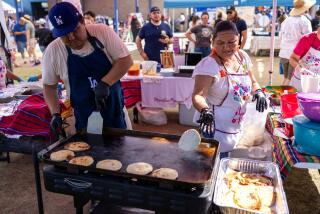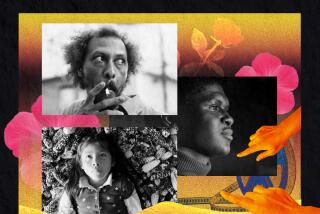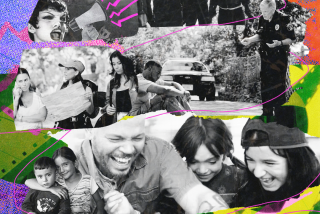Salvadoran Poet Sparks Furor : L.A. Festival: A committee wants event officials to provide âideological balanceâ by inviting a leftist poet in addition to David Escobar Galindo, who they claim has links to the government.
Art will clash with politics today when Los Angeles Festival organizers meet with representatives of Los Angelesâ Salvadoran community, who are concerned that a Salvadoran poet with links to that Central American nationâs government may be the only poet speaking for El Salvador at the festival.
Artistas en Accion (Artists in Action), a local committee of Latino and Central American artists, as well as Salvadoran community leaders, have complained to festival organizers over the appearance of David Escobar Galindo, who will represent Salvadoran President Alfredo Cristiani in an upcoming peace negotiation between Cristiani and the countryâs leftist rebels.
The group is demanding that the festival add a Salvadoran poet from the political left to provide balance during the September arts festival, which celebrates the cultures of the Pacific. Galindo will represent El Salvador in âLa Terra Nova 1990: Pacific Poetry Festival,â a part of the larger festival that will bring together 10 poets representing Colombia, Ecuador, Nicaragua, Mexico, Canada, Bolivia, Chile, Peru, Mexico and El Salvador.
âWe ask the festival for one thing only--not to cancel Galindoâs appearance, but we would like the festival to invite another Salvadoran writer of equal stature who would give an equal ideological balance,â said Ruben Martinez, a local Salvadoran poet and journalist. He added that the only other Central American poet on the schedule, Managuaâs 78-year-old Pablo Antonio Cuadra, also represents right-wing beliefs.
âThe other main point is that there was little or no consultation with the local Salvadoran community. Had there been a consultation, we would have suggested several other writers . . . who would have given a more representative view of the El Salvadoran community in general,â Martinez said.
âGalindo . . . clearly has violated the civil rights of the Salvadoran people. . . ,â Martinez claimed. âHe is respected as an artist and as an intellectual, but his is part of the apparatus that is responsible for the jailing, exiling and assassination of many El Salvadoran writers, poets and artists.â
In a telephone interview from El Salvador, an angry Galindo said that the questioning of his politics âreminds me of the Inquisition.â
âTo have oneâs politics questioned is against the concept of art,â he said.
Galindo added that although he was appointed by President Cristiani to a commission participating in peace talks in September, he will participate as an independent--not as a representative of the president. âI donât represent his party and I have never belonged to a political party,â Galindo said.
âI am accustomed to this kind of situation, because I come from the reality of living in this country (El Salvador) for many years. There has always been a group of left-wing radical writers who ideologically donât accept pluralism. I have always been a liberal and Iâve been against all fanaticism and discrimination. I respect them, but they seem to have a hard time respecting me.â
Festival director Peter Sellars responded to a letter of complaint from local protesters with another letter, inviting them to the Wednesday evening meeting and apologizing to the Salvadoran community for the festivalâs âlack of informationâ about Galindoâs politics.
Festival program director Claire Peeps, who will attend the meeting, said that festival organizers are open to the idea of bringing in another poet--although finding funds and arranging for another participant could be difficult at this late date.
And Peeps believes that the festival must take the politics of its artists into account.
âAbsolutely,â Peeps said. âOf course, if it (the artistâs politics) were to come up in every instance, Iâm not sure we could handle it, but in this case information has come to light that we were not aware of.â
Florinda Mintz, who organized âLa Terra Nova 1990â with Paul Vangelisti, said she was âshockedâ when she discovered Galindoâs government ties. But she defended inviting Galindo to the festival and expressed concern that bringing in another poet to appease the Salvadoran community could invite similar reactions about other artists. âOther countries have problems, too,â Mintz said. (Peeps said that so far the festival has received no other complaints.)
âWe never tried to offend anybody,â Mintz said. âWe were just looking for a poet, we werenât looking for a revolucionario . . . . We donât go into peopleâs private lives.
âPeople are accusing us of not consulting them, and they feel offended, but we didnât consult the Chileans, we didnât consult the Guatemalans. The poet from Ecuador (Alfonso Barrera Valverde) is an ambassador; no one asks why we are bringing in an ambassador. I know poetry in Latin American is very (politically) powerful; that is why we are doing this (the festival).
âThere is the same problem with the Los Angeles Festival,â Mintz added. âIt is supported by government grants, and that is the same government that is supporting the war in El Salvador.â
Mintz said that she and partner Vangelisti are willing to bring in a leftist poet, but that they want to choose the artist, rather than hosting a poet selected by the Salvadoran community--which has already compiled a list of possibles. Mintzâs first choice: Eduardo Sancho, who will represent leftist rebels in the peace talks with Cristiani. Galindo said he supported the idea of the festival bringing in another poet.
Peeps said that the festival organizers will decide who will choose the new poet at todayâs meeting.
Times staff writer Oscar Garza contributed to this report.
More to Read
Sign up for Essential California
The most important California stories and recommendations in your inbox every morning.
You may occasionally receive promotional content from the Los Angeles Times.










